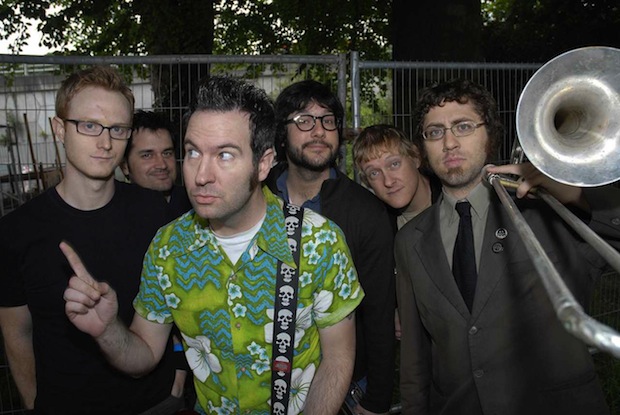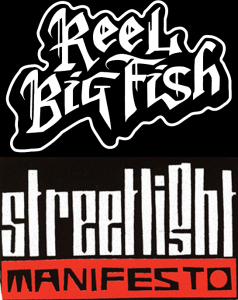Reel Big Fish is my favorite product of the “third wave of ska” from the mid-1990s. Their brand of ska-punk features melodic, flashy tunes paired with lyrics often described as “sarcastic” and “bitter.” Their music could easily have degenerated into braindead party jams, but lead songwriter and frontman Aaron Barrett keeps it funny, emotionally grounded, and hooky.
RBF’s career is more interesting, though, than part of a chart fad from twenty years ago (yeah, it’s been that long). After striking moderate chart success in 1996 with their signature album, Turn the Radio Off, and its lead single, “Sell Out,” the band continually produced good albums filled with memorable, jaded songs.
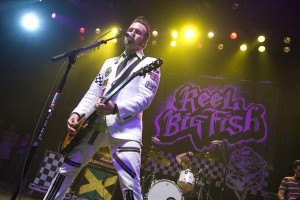 The band continued touring, providing entertaining and inexpensive shows, often on the east coast. They honed their act as their audience thinned to hardcore ska fans. They developed a reputation for world-class instrumental performances, amusing on-stage banter, and a polished, professional show.
The band continued touring, providing entertaining and inexpensive shows, often on the east coast. They honed their act as their audience thinned to hardcore ska fans. They developed a reputation for world-class instrumental performances, amusing on-stage banter, and a polished, professional show.
That’s really the #1 reason why I love RBF: Their dedication to good shows. I’ve seen them five-ish times, and they’re always a treat, even as the band members enter their 30s and (gasp) 40s.
Let’s take a quick look at their career and some of the defining traits of their music:
Reel Big Fish formed, like so many great ska bands, in Southern California in the early ‘90s. They built their chops opening for underground punk and ska bands like The Mighty Mighty Bosstones and the now-legendary Suburban Rhythm.
The band locally released its self-recorded debut, Everything Sucks. It became a cult hit, burned and passed around at shows and college campuses, thanks to propulsive melodies, sparkling horn parts, and snarky lyrics.
It wasn’t long before major labels were knocking at their door. The band signed for four albums with Mojo Records, a deal that proved about two albums too many.
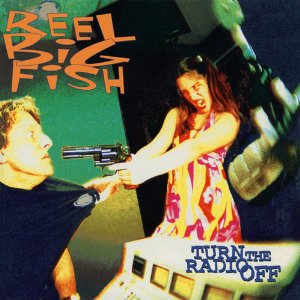 Their major-label debut, Turn the Radio Off, refined the hooks of their debut, and included several radio-ready tracks. They supported the album with some heavy touring, and the album became a hit — particularly tongue-in-cheek single “Sell Out,” which told the story of the band signing with a major label in a sarcastic tone.
Their major-label debut, Turn the Radio Off, refined the hooks of their debut, and included several radio-ready tracks. They supported the album with some heavy touring, and the album became a hit — particularly tongue-in-cheek single “Sell Out,” which told the story of the band signing with a major label in a sarcastic tone.
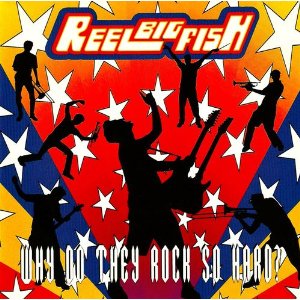 Their follow-up, Why Do They Rock So Hard?, lacked a signature single but maintained the charm of the original with an even sharper edge. Barrett continued his sardonic commentary on the recording industry with bitter tracks like “Big Fuckin’ Star.”
Their follow-up, Why Do They Rock So Hard?, lacked a signature single but maintained the charm of the original with an even sharper edge. Barrett continued his sardonic commentary on the recording industry with bitter tracks like “Big Fuckin’ Star.”
The band continued their heavy touring as ska went out of style. The industry mandated that Reel Big Fish grow up a little bit, but they took their sweet time. It took four years, but they released their third major-label album, Cheer Up!, in 2002.
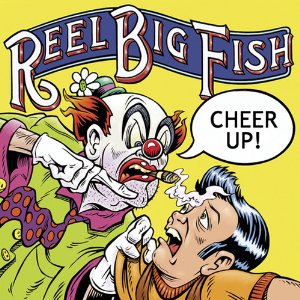 More polished and straightforward pop-rock, their third album a diversion from their default, but a startling, minor miracle. The band stretches their palate — “Where Have You Been?” is borderline brooding, “Drunk Again” is a bona fide ballad (voiced by their backup singer), and an a capella rendition of “New York, New York” comes out of left field.
More polished and straightforward pop-rock, their third album a diversion from their default, but a startling, minor miracle. The band stretches their palate — “Where Have You Been?” is borderline brooding, “Drunk Again” is a bona fide ballad (voiced by their backup singer), and an a capella rendition of “New York, New York” comes out of left field.
It’s their least characteristic album, but their most diverse. Turn Off the Radio will always be their trademark work, but for my money Cheer Up! is their best studio album by a considerable margin. Too bad the album tanked commercially.
The relationship between the band and their label, now owned by Jive Records, began to rapidly sour. The band took three years to create their next album, and it crashed and burned commercially even worse than Cheer Up!
We’re Not Happy ‘til You’re Not Happy, released in 2005, is the band’s darkest outing by a considerable margin, full of anger and self-doubt. The cynicism is turned up to 11 as the band reflects on their career that had come off the rails:
You might think that it’s cool to get up on stage / And play rock and roll from your heart and soul / But no one shows up, and your songs all suck / And there’s no applause and no flying bras / No girls will scream for you and no one’s gonna sing along with you.
At long last, Reel Big Fish broke free from the major label where they’d worn out their welcome (and desperately wanted out). They celebrated this, of course, by releasing their best album ever, a masterpiece and one of my favorite albums.
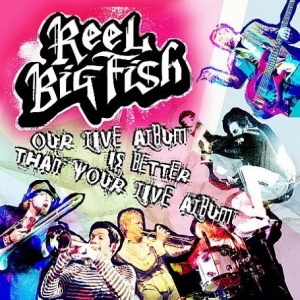 Our Live Album is Better Than Your Live Album is a distillation of everything that makes Reel Big Fish great, a 38-track collection of the band’s best songs spiced up with great live arrangements, incredible performances, and absurd on-stage banter. The horn parts are more improvisational and sharper than the studio versions, and the band’s passion conveys in a way it never did in studio.
Our Live Album is Better Than Your Live Album is a distillation of everything that makes Reel Big Fish great, a 38-track collection of the band’s best songs spiced up with great live arrangements, incredible performances, and absurd on-stage banter. The horn parts are more improvisational and sharper than the studio versions, and the band’s passion conveys in a way it never did in studio.
Jive had one last cruel trick up its sleeve. Now the legal owners of all of Reel Big Fish’s recordings, they remastered several tracks and released a greatest hits album (cleverly named Greatest Hit and More). The album earned the ire of the band, who had no say in its creation and didn’t see a single dime from its sales. Fans fought back and gave it a 1-star average on Amazon that it holds to this day.
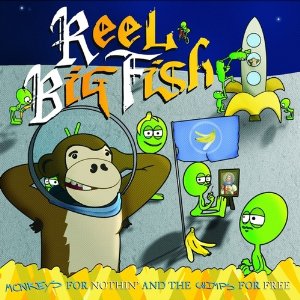 Reel Big Fish continued to tour, and a year later released their first independent studio album, Monkeys for Nothing and the Chimps for Free. It’s a happier album than they’d ever previously released, but it also was their worst collection of songs yet. Even the highlights (the gleefully profane “Another F.U. Song”) sound like rehashes from the band’s better moments (“Nothin’”).
Reel Big Fish continued to tour, and a year later released their first independent studio album, Monkeys for Nothing and the Chimps for Free. It’s a happier album than they’d ever previously released, but it also was their worst collection of songs yet. Even the highlights (the gleefully profane “Another F.U. Song”) sound like rehashes from the band’s better moments (“Nothin’”).
Unfortunately, the band would never regain their studio mojo. A mediocre 2009 cover album (Fame, Fortune, and Fornication) and a disappointing 2012 album of originals (Candy Coated Fury) have decent melodies and performances, but are nothing special or original..
That doesn’t mean the band had stopped caring about the fans. Quite the opposite, actually. Their independent albums so staunchly adhere to their old-school style that it’s possible to view them as fan service. Their shows remained cheap and packed with great co-headliners like Streetlight Manifesto, Suburban Legends, Less Than Jake, and The Aquabats.
The band also re-recorded most of its Jive-owned tracks, and released them as an awesome package called A Best of Us… For the Rest of Us. The second disc of the package included acoustic versions of several their songs on a disc called “Skacoustic.”
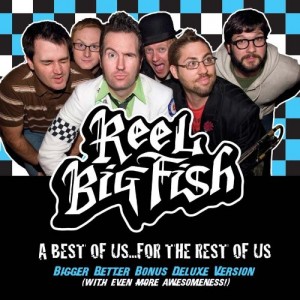 As if that wasn’t enough of a treat, they released a mammoth “Bigger, Better, Bonus Deluxe Version” of the collection that contains a whopping 78 tracks of re-recorded originals, skacoustic tracks, live recordings, and covers. For fans, it’s a treasure trove, and it even makes a decent introduction to the band.
As if that wasn’t enough of a treat, they released a mammoth “Bigger, Better, Bonus Deluxe Version” of the collection that contains a whopping 78 tracks of re-recorded originals, skacoustic tracks, live recordings, and covers. For fans, it’s a treasure trove, and it even makes a decent introduction to the band.
So, back to the question at the core of this article: What is it that I love about Reel Big Fish?
Well, it starts with the tunes. Reel Big Fish started life as a cover band for catchy hair metal songs, and their heroes’ knack for towering hooks and guitar-driven melodies. There’s also a heavy element of punk rock: fast, driving beats that blitz often blitz through multi-verse songs in about two minutes.
The band has had a high turnover rate, but its members have universally been incredible musicians. Barrett has been steady as the dynamic vocalist. Scotty Klopfenstein, backup vocalist and trumpeter, was another stalwart before he retired in 2011. Danny Regan was a longtime tromboner before leaving the band in 2013. Johnny Christmas (John Christianson) has played lead trumpet since 2005.
What they all have in common is great technical skill and performance charisma. The two highlights, in particular, are Barrett and Klopfenstein. They provided the band its identity and defined its silly, often absurdist personality.
One strength of Reel Big Fish’s that is consistently underrated is the band’s writing. Critics often described the band’s lyrics in dismissive terms with words like “sarcastic” and “snarky,” but I think there’s a compelling pathos here. Songs like “Drinkin’,” “Nothin’,” and “She Has a Girlfriend Now” are both disguised as frat boy anthems — about beer, swearing, and chicks making out, respectively — but thinly veil loneliness and longing that give the song a emotional core.
Barrett, responsible for the majority of the band’s lyrics, has a sharp, self-deprecating edge that provides some of the most compelling and amusing commentaries you’ll ever hear on fame and the recording industry. “Sell Out” is an obvious highlight, but “She’s Famous Now,” “Don’t Start a Band,” “Somebody Hates Me,” and “The Kids Don’t Like It” are equally worthwhile.
I’ve repeatedly cited the band’s live shows in this article, and I still think that they’re the key for what makes this band so appealing. They’re great, energetic performers with unpredictable setlists who tour nonstop.
But, above all, it’s the great moments and lines that make Reel Big Fish stand out: Scotty Klopfenstein shouting “I want to smell you!” in the background of the live version of “She Has a Girlfriend Now,” the “fucking noise” at the beginning of “A Little Doubt Goes a Long Way,” the F-bomb explosion in “Nothin’,” the falsetto chorus of “The Set Up,” and so many others. One recent favorite of mine has been the opening line of “Drunk Again”:
If I had a dollar bill for every time I’ve been wrong / I’d be a self-made millionaire, and you’d still be gone
So good.
Reel Big Fish is just a ridiculously fun, surprisingly insightful, extremely catchy, all-time great ska band.


